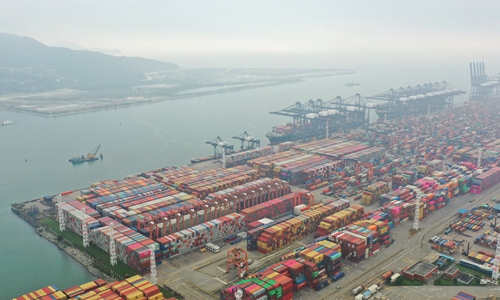Chinese private firms diversify markets amid trade war
Alibaba envisions digital international trading port

A view of a port in Shenzhen, South China's Guangdong Province in April Photo: CNSphoto
Online business-to-business (B2B) platforms are enabling many Chinese companies easier access to global markets and more trade opportunities amid the trade war and global uncertainties.China's e-commerce giant Alibaba announced on Thursday that it is aiming to build Shenzhen, known as China's "silicon valley" in South China's Guangdong Province, into the country's first digital international trading port through its online B2B platform.
"We are currently in close cooperation with Shenzhen's local authorities in customs to digitalize the whole process of exports, from business registration to clearance, to make sure that the procedure will be completely paper-less and hassle-free," Zhang Kuo, general manger of Alibaba's international trade site, told the Global Times on Thursday.
The construction of the digital port is expected to lead to a dramatic reduction in the cost of starting a B2B enterprise and reaching global customers. The move will give local businesses, most of which are in the electronic components industry, a strong boost as the sector grapples with uncertainties from the 18-month trade war with the US, industry insiders told the Global Times.
Taking foreign trade online has diversified the client profiles of small to medium-sized businesses in China, as they can directly reach clients of all sizes around the world.
Trade with the US still takes up the biggest share of transactions on Alibaba's international station, with around 20 percent of total sales volume, Yu Yong, general manger of the Alibaba international station, told the Global Times on Thursday. However, many companies are looking at emerging markets for more growth potential.
"The 25 percent tariff on some Chinese goods to the US has heavily influenced our business with large US vendors since the beginning of this year," Lin Musong, general manager of Shenzhen Enle Industrial Co, told the Global Times.
At the same time, the number of clients in Southeast Asia has been on a steady rise, and the company also plans to explore more business in the Middle East, according to Li.
"Countries in the Middle East are like China was 30 years ago, as they are transitioning from 3G networks to 4G and have a huge demand for related electronic products." Yang Kaixuan, general manager of Shenzhen Feixin Intelligent Co said. "We are looking to deploy our business there as early as next year."
Exports by privately-owned companies have become a driving force behind China's foreign trade. Exports of privately-owned companies increased 12.4 percent from January to November this year, taking up to 51.4 percent of total foreign trade, according to the statistics from the Ministry of Commerce.
